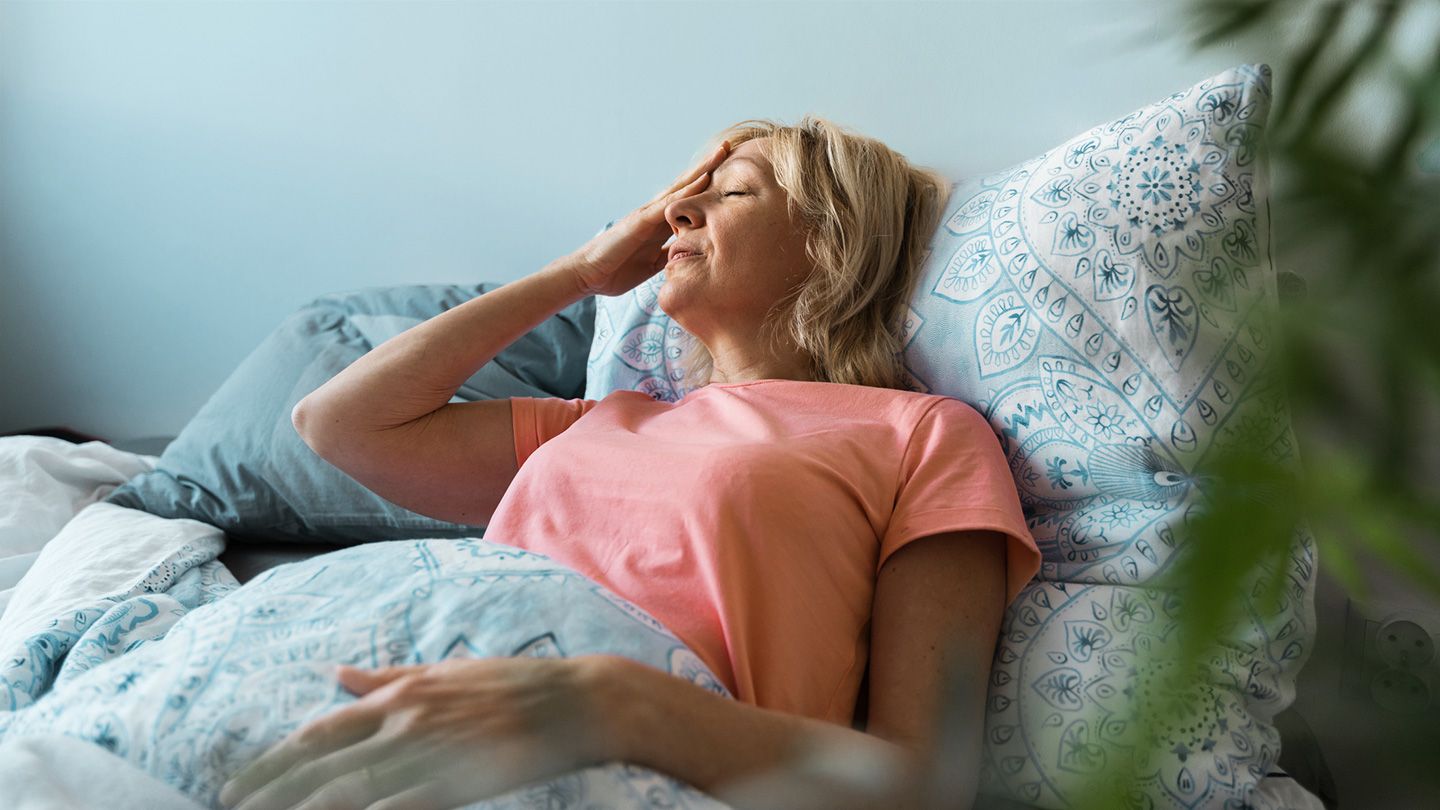Hot Flashes and Night Sweats May Be Connected to Alzheimer’s Risk

Hot flashes, a common symptom of menopause, have already been linked to poor memory and alterations in brain structure, function, and connectivity.
Now study findings presented this week at the annual meeting of the Menopause Society indicate that hot flashes (also called vasomotor symptoms) may be early signs of an increased risk of Alzheimer’s disease (AD) — especially when symptoms occur during sleep, when they are known as night sweats.
“We found that women with more sleep hot flashes had greater markers of amyloid, which is a component of the biology of AD,” says Rebecca Thurston, PhD, the director of the Women’s Biobehavioral Health Program at the University of Pittsburgh department of psychiatry. “These biomarkers can provide critical information on an individual’s future risk of AD.”
How Did the Study Connect Hot Flashes With Alzheimer’s Risk?
For this investigation, researchers followed 248 women with menopausal symptoms, ranging in age from 45 to 67. Participants wore monitors that measured hot flash symptoms (such as skin temperature and sweat) over a 24-hour period.
The scientists also took blood samples from subjects in order to assess levels of protein pieces called beta-amyloid 42/40 in the plasma. As a study in the journal Neurology explains, beta-amyloid 42/40 is a biomarker (a measurable biological indicator) for amyloid plaques — abnormal protein clumps in the brain that are thought to play a crucial role in the development of Alzheimer’s disease.
The scientists found that women who had more night hot flashes were more likely to have lower levels of beta-amyloid 42/40. Low beta-amyloid 42/40 ratios are associated with a clinical diagnosis of Alzheimer’s disease (as Labcorp explains), although this does not mean a patient definitely has the disease.
Dr. Thurston notes that she and her team could not quantify the degree of Alzheimer’s risk linked to the hot flashes “as the science of AD biomarkers is not quite there,” she says.
These latest study results align with Thurston’s prior research (published in January 2023 in the journal Neurology) showing that women with more night sweats had more white matter hyperintensities, another indicator of dementia risk.
Menopausal Symptoms Should Be a ‘Wake-Up Call’
The Alzheimer’s Association estimates that more than six million people in the United States have Alzheimer’s disease; two-thirds are women.
“Given how much of the population is impacted, it is very important to determine what factors increase the risk of developing Alzheimer’s or what things can be an early sign of someone who is at risk,” says Asima Ahmad, MD, MPH, a reproductive endocrinologist and the chief medical officer and cofounder of Carrot Fertility. “Determining this can help us develop potential therapies to intervene early and possibly prevent or delay the onset of this medical condition.”
Dr. Ahmad, who was not involved in the new study, urges women experiencing menopause symptoms to have an open and honest dialogue with their physician to discuss treatment options as early as possible.
Women who experience frequent hot flashes, particularly during sleep, may want to reduce their risk of dementia through efforts such as improving their sleep, eating a healthy diet, getting regular physical activity, moderating alcohol use, and treating hypertension or diabetes if they have those conditions, says Leah Millheiser, MD, a clinical professor of obstetrics and gynecology at Stanford Health Care in Palo Alto, California.
“This is a wake-up call for women in general to make sure they’re staying on top of their health,” says Dr. Millheiser, who was not involved in the study. “It is important for women to know that because of this association, you want to do everything that you can to maximize your health during the menopause transition and beyond.”
Explaining the Hot Flash–Alzheimer’s Connection
As the Alzheimer’s Society points out, the hormonal shifts of menopause may be related to dementia risk. The hormone estrogen is essential for proper memory function, but it declines when women reach menopause.
Sleep disturbances, which are common with night sweats, may also negatively impact cognitive processes such as memory.
In this study, however, the authors accounted for estrogen levels and disrupted sleep, and found that the risk associations observed were not explained by these factors.
More research is needed to understand the underlying mechanisms that may explain the relationship between night hot flashes and dementia, and whether treating hot flashes supports women’s brain health, according to Thurston.
Millheiser would like to see further studies involve a more diverse population; in the current investigation, about 8 out of 10 participants were white.
“We know that Black women will experience hot flashes that are more severe and last a longer period of time, so I’m interested in how that affects dementia risk in that specific population as well as in other racial backgrounds,” she says.









